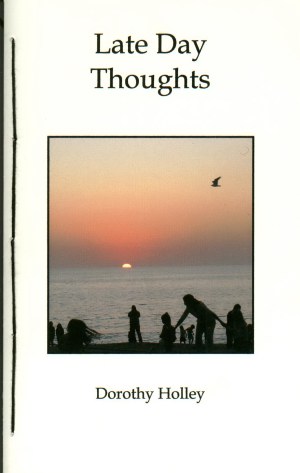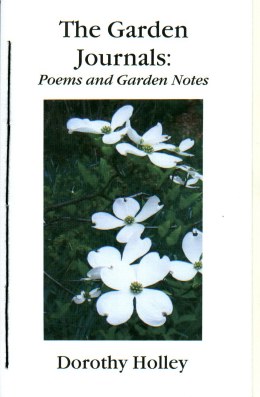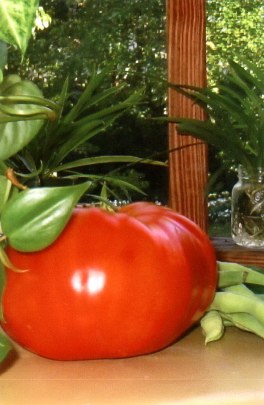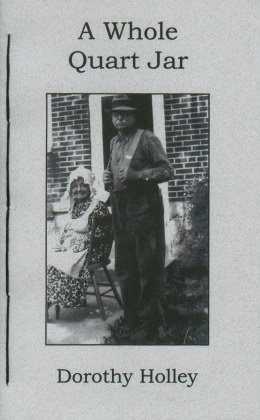Holley
Dorothy Holley
Late Day Thoughts
Dorothy Holley's poems speak, even sing, the meaning of the everyday. A bare object, a dried can of paint, a rusty nail or unused clamp, becomes a repository of human connectedness. The fences built to separate us do not hold. Now collapsing/with space between the slats, the children will pass through-they laugh/as they dart from yard to yard. Generations are connected by silver spoons, fashioned from saved silver dollars. An embittered soldier is brought to life by a smile on a daughter's face. These skillfully wrought poems peel away layers of strife, reveal a world of music, love and hope that defines us as human family.
-Joseph Karasek
In Late Day Thoughts, Dorothy Holley reminds us each of our individual flight, our joy at being alive: this is her true music-the bird's journey, the mischievous squirrel, the plant returning. Holley instructs us in the power of the brave, singular voice, how it breaks the night in half until the unimaginable burden of one becomes bearable as the story shared. As these poems travel the difficult, poignant path of cancer and the illness of loved ones, it is the late day thoughts that sustain: when the light shifts, when it's time to take stock- Dorothy Holley brings us back to the pivot of the day, waking us again to the peach tree's returning, the sweet joy of the daily surprise. This wild poet shows us once again that she is a poet of praise, and that it's the tenderness that remains.
-Jan Beatty
Dorothy Holley's book forms a Trilogy with
A Whole Quart Jar and The Garden Journals.
From the book:
Bring in the Green Tomatoes
All this time paying bills
for gas, electric, water in and out,
taxes, gifts, credit cards and which
to use to put off paying the longest
and what bank to choose
when the CD comes due.
Time to find my garden hat, shoes,
clippers dull from years of use,
cut back the old rose bush.
On my knees trim the peonies
close to the ground and bury
the peelings in the compost pile,
bring in the green tomatoes,
wrap them in old newspaper.
The Last Rose
A rose bush greens in spring,
flowers in summer. Every day
I cut emerging buds to create
a bouquet to give away or grace
my home risking the hurt of thorns
for beauty can extract a price.
Now, the bush appears flowerless.
All the petals are gone, fallen
on the ground but I find
one bud in its slow unfolding,
bring it in, place it in a vase,
value it more than a full bouquet.
Late Day Thoughts
is an 80 page hand-stitched paper book with spine.
$15.00
TO ORDER ON-LINE
 The Garden
The Garden
Journals:
Poems and Garden Notes
(with 10 color photos by the poet)
The Garden Journals invites you into its patient, attentive enclosure. Dorothy Holley not only animates the natural cycle of the seasons with her words; she animates the pages with the cultivation of her own life- in all of its seasons.
-Ellen McGrath Smith
It's wonderful to have another book by Dorothy Holley. The Garden Journals is sheer delight, filled with wisdom and joy. If Baudelaire had read Dorothy Holley, he wouldn't have been so grumpy.
-Michael Wurster
In The Garden Journals, Dorothy Holley is our poetic field guide through the tall grasses, to the pink buds of the peach tree, past the yellow glory of the forsythia to the rhododendrons and the bowing evergreen. We are thrust into the world of the city garden with its surge and restraint, its far-reaching gifts and musings. This is the poetry of an engaged life, a life lived with one's eyes open and observing. In Holley's world, absence is a visual landscape, sorrow is palpable, yet there is waiting, waiting-then joy. The compression of her poetic line, coupled with the more meditative tone of her garden notes, enact the very movement of the opening and closing of one of her cherished flowers-yet she never strays by sinking into sentimentality-she sustains us with each small surprise of her blooming, vital language.
-Jan Beatty
From the book:
To Lisa
Six decades difference
in age, we sit
on the porch and talk,
view the garden,
watch the chickadees,
sip our tea iced with mint
and the clematis deepens
its roots, ready to flower.
When I say, I should start
giving things away, and ask,
What would you like?
you reply, Your garden diaries.
September 7-05
The tomatoes are very disappointing this year. They seem to have a blight with spotted leaves that turn yellow. But the Big Boy that Jack gave me and took a long time to grow in my garden finally produced a few beauties.
Dorothy has maintained her small city garden of vegetable, flowers and trees for twenty-five years.
The Garden Journals
is a 92 page hand-sewn paper book with spine - $18.00
TO ORDER ON-LINE
 A Whole Quart Jar
A Whole Quart Jar
Cover photo of author's grandparents (Philip and Mary Elizabeth Hance) taken by author with a box camera when she was a young child.
These poems are told with hands in the dirt, feet following the plow, and the heart beating to the rhythm of work. These are poems of familial memory that resides as much in the body as it does the land the body inhabits. In A Whole Quart Jar, Holley writes with great tenderness of the events of a life, generations of life, in language that is honest and straightforward. But the greatest accomplishment of these poems and the cumulative narrative they tell is the larger story that emerges from them. Whereas, the backdrop is specific to an era, a place, and its people, the reader should not be fooled. There is a greater story here, one where each of us holds a place: be it the bird or the sow, the mother or the child, the farmer or the soldier. Holley makes us recognize that we each hold the hoe in our hands. In the cyclic rhythm of all things living and dying, we work the earth with her.
-Maria McLeod
In the compressed lines of Dorothy Holley's poems, we find the idiom of America in the 1930's-spare and straightforward talk. And just beneath these lines is the history of generations of farm life, with its choices as tough and unforgiving as the land itself. Hers is the song of a single voice of place-unsentimental and trustworthy-its idiosyncratic diction breathing the rhythms of history and lives lived. These poems are stunning in their reserve and their love of story. In A Whole Quart Jar, Holley transports us to the fields and the
families, and we are surprised to find our own humanity there.
-Jan Beatty
From the book:
A Whole Quart Jar
We seldom went to the store.
In the twenties and thirties
on our farm in Ohio
Holstein cows provided milk,
leghorn chickens eggs and meat.
With the sun still in them
we ate fresh from the garden,
or canned for winter's use,
peas, tomatoes, beans and corn.
Hands both small and large
seeded ripened cherries.
My mother, when I was four,
took the ones I seeded
and filled a whole quart jar.
Limits
On the farm water comes
from cisterns or deep dug wells.
Both depend on the rains.
There never was too much.
When bath time came
my city cousins were amazed
at my mother's limit
of three inches in the tub.
A Whole Quart Jar
is a 68 page hand-sewn paper book with spine - $15.00
TO ORDER ON-LINE



